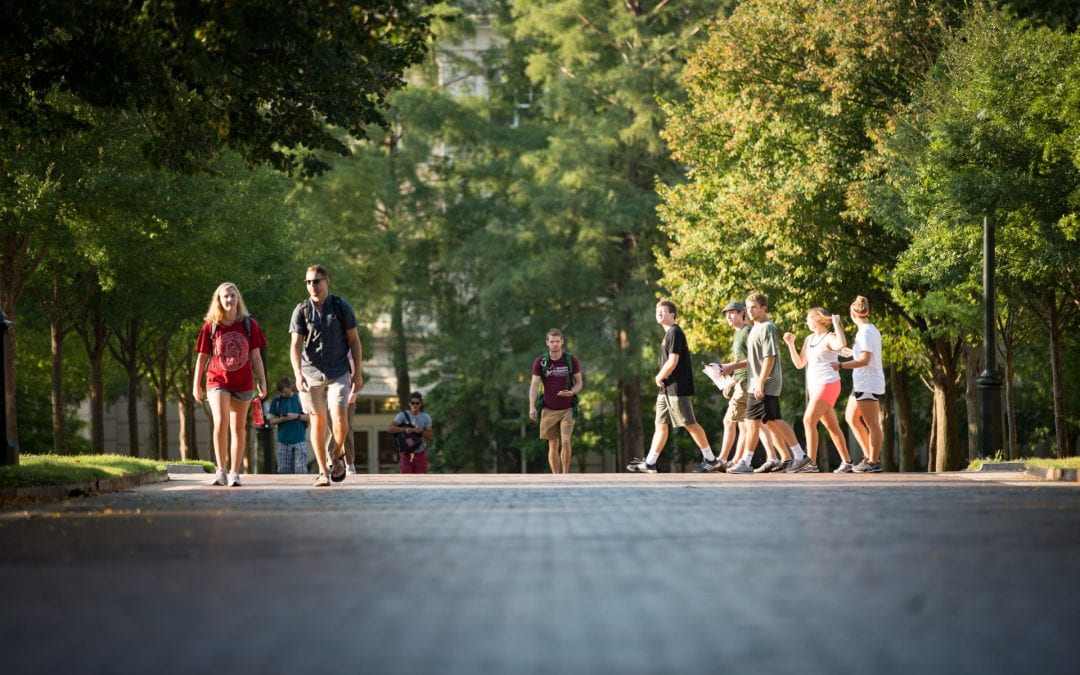The start of a new academic year always brings about a revived sense of excitement and anticipation. If you’re an incoming freshman, this is the start of a new way of life – full of newfound freedoms and the power to become your best self.
The Office for Sustainability has put together a list of resources to help make your time on campus as sustainable as possible! While this article is geared toward a life on campus – anyone can make use of these resources.
If you have no idea where to start, we find it helpful to begin with calculating your carbon footprint. A carbon footprint is the total amount of green house gases (including carbon dioxide and methane) that are generated by our actions. This can help you figure out what areas of your life contribute to your footprint the most. Take the quiz here.
Academics:
The University of Arkansas offers a Sustainability Minor that can be tacked on to any major and tailored to your interests. Find out more here.
Green Cleaning:
Messy room, messy life. I’m sure this is a sentiment we can all relate to. Living on your own comes with endless chores. Make sure you’re purchasing green alternatives to harsh chemicals, safer for you and the environment. A comprehensive list of potential swaps can be found here.
Wellness:
Be sure to take care of yourself! A rigorous academic schedule is hardly sustainable without making time to work on yourself. Check out the variety of classes that are offered at the HPER here.
Zero waste:
The University of Arkansas plans to achieve 50% diversion by 2021, 70% diversion by 2027 and 90% diversion from landfill by 2040. This means that at least 90% of discarded materials at the University of Arkansas must be diverted from the landfill. This is achieved by avoiding landfill-only materials and actively recycling and composting. Ultimately, our goal is to have less overall to divert and instead focus on aversion. Be sure to ask your RA for a green bag to sort your own recycling in the dorm if you haven’t already received one! Find out more about our recycling program, electronic waste pick up locations, and composting on campus and in the city here.
Transportation:
The Office for Sustainability’s transportation work focuses on decreasing dependence on single occupancy automobiles while promoting more sustainable transportation options such as walking, biking, buses and carpooling. If you want to identify the most efficient way to commute to campus, but don’t know where to start, we will find the appropriate mode of transportation for your commute depending on a variety of factors. For customized evaluation of your commute, we invite you fill out a commuter scorecard. We’re happy to provide you a personalized door-to-door analysis from your home to office or classroom.
To navigate on and off campus check out the FREE Razorback transit system map to see which route to take. The city of Fayetteville has also partnered with VeoRide and SPIN to provide electric scooters, e-bikes, and pedal bikes to rent. You can find rules for riders on our website here. If you do decide to bring a car to campus, you can purchase a parking permit here. There are Electric Vehicle charging stations located in a few select spots on campus. Find them on a map here.
Water:
Reduce plastic use and pollution by bringing your own water bottle! We make it easy to find the water fountains with bottle refilling attachments; the university has partnered with the FindTap app to provide a map of the locations on campus.
Give and Take:
The Associated Student Government is in the process of creating a ReUse Room. This room will function as a free store to students for a range of items, but especially school supplies. Last year, ASG collected donations for inventory which are now available to pick up in the ASG office Union A-669. As the project grows it will transition to a space dedicated to the store. Take what you need, give what you can!
Food:
The University of Arkansas has dedicated itself to becoming zero-waste by 2040, and the Office for Sustainability wants to help our students work toward the same goal. The most effective method to achieve this goal is to stop waste before it is distributed. To help students achieve this, The Office for Sustainability has prepared a guide detailing the zero-waste friendly policies of all our on-campus dining facilities! This guide will be updated this semester to reflect the changes in restaurants; however, it is a great example of criteria to check when making food decisions.
Stay Informed:
Want to learn more about Sustainability and how to get involved? Sign up for the Office for Sustainability newsletter and check out our blog!
By Sydney Golding, Biodiversity Coordinator.
